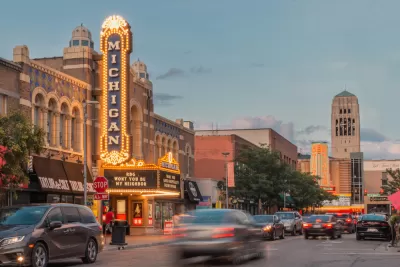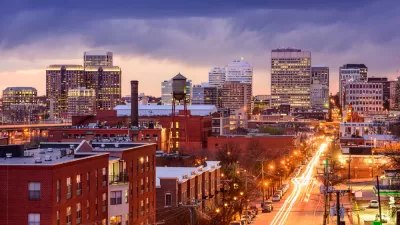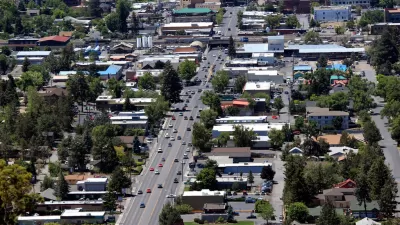Ann Arbor, Michigan approved changes to the city’s Unified Development Code (UDC) earlier this week that eliminate off-street parking requirements for a variety of development types throughout the city.

The Ann Arbor City Council voted earlier this week to eliminate parking requirements throughout the city—another incremental step for the parking reform movement built on the research and rhetoric of Donald Shoup, author of the High Cost of Free Parking.
Josh Hakala reported the news of the zoning changes for WEMU, after the news of the vote was left to circulate on Twitter for an entire day. Hakala’s brief account of the news includes a soundbite from Ann Arbor Councilmember Erica Briggs.
“According to Briggs, by eliminating unnecessary parking, developments are able to save money, which makes housing and businesses more affordable. She says by reducing the amount of asphalt and using less space for parking, the city can be more walkable, which is good for the environment,” writes Hakala.
A city staff report prepared in advance of the vote lists the kinds of land uses that would no longer require minimum numbers of parking spaces to include residential occupancies, adult and child care centers, outdoor recreation, transit corridor developments, and nonprofit corporations. Other changes, like changes to the Required Parking-Calculating Required Parking section of the UDC were also approved by the city council.
For more analysis of the vote, see a blog post by Nat. M. Zorach for the Handbuilt City. According to Zorach’s assessment, the zoning changes implemented by Ann Arbor “may bode well for a region that has struggled to adopt more progressive transportation and land use policy measures.”
Zorach’s coverage, linked in the source article below, includes background on parking requirements and the intended goals of reforms like those approved in Ann Arbor.
FULL STORY: Ann Arbor Axes Parking Minimums. In Michigan, That’s Huge.

Manufactured Crisis: Losing the Nation’s Largest Source of Unsubsidized Affordable Housing
Manufactured housing communities have long been an affordable housing option for millions of people living in the U.S., but that affordability is disappearing rapidly. How did we get here?

Americans May Be Stuck — But Why?
Americans are moving a lot less than they once did, and that is a problem. While Yoni Applebaum, in his highly-publicized article Stuck, gets the reasons badly wrong, it's still important to ask: why are we moving so much less than before?

Research Shows More Roads = More Driving
A national study shows, once again, that increasing road supply induces additional vehicle travel, particularly over the long run.

Judge Halts Enforcement of Anti-Homeless Laws in Grants Pass
The Oregon city will be barred from enforcing two ordinances that prosecute unhoused residents until it increases capacity and accessibility at designated camping sites.

Advancing Sustainability in Los Angeles County Schools
The Los Angeles County Office of Education’s Green Schools Symposium brings together educators, students, and experts to advance sustainability in schools through innovative design, climate resilience strategies, and collaborative learning.

Using Old Oil and Gas Wells for Green Energy Storage
Penn State researchers have found that repurposing abandoned oil and gas wells for geothermal-assisted compressed-air energy storage can boost efficiency, reduce environmental risks, and support clean energy and job transitions.
Urban Design for Planners 1: Software Tools
This six-course series explores essential urban design concepts using open source software and equips planners with the tools they need to participate fully in the urban design process.
Planning for Universal Design
Learn the tools for implementing Universal Design in planning regulations.
City of Moreno Valley
Institute for Housing and Urban Development Studies (IHS)
City of Grandview
Harvard GSD Executive Education
NYU Wagner Graduate School of Public Service
City of Cambridge, Maryland
Newport County Development Council: Connect Greater Newport





























